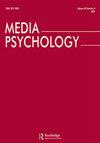Skype还是Skip?计算机介导的医患沟通中亲密自我表露的原因与后果
IF 2.6
2区 心理学
Q1 COMMUNICATION
引用次数: 3
摘要
计算机媒介通信的进步为在线医患沟通创造了机遇和挑战。基于隐私演算和客观自我意识理论,我们研究了视频咨询中亲密自我表露的原因和后果。我们在荷兰人口(N = 2251)的大量代表性样本中进行了2(口头亲密)× 2(身体亲密)的在线实验。结构方程模型证实了利益、隐私问题、沟通障碍、信任和自我披露之间的预期关系。一般来说,当人们更愿意自我表露时,他们会报告更多的积极情绪(如解脱)和更少的消极情绪(如压力)。然而,当涉及到身体上的亲密信息(例如,展示亲密的身体部位与非亲密的身体部位)时,人们不太可能自我披露,结果报告了更多的负面情绪。我们的研究结果表明,人们在自我表露的决定中会权衡收益、成本和信任,并考虑亲密的自我表露对个人的潜在负面影响。本文章由计算机程序翻译,如有差异,请以英文原文为准。
Skype or Skip? Causes and Consequences of Intimate Self-Disclosure in Computer-Mediated Doctor-Patient Communication
ABSTRACT Advances in computer-mediated communication have created both opportunities and challenges for online doctor-patient communication. Based on the privacy calculus and objective self-awareness theory, we examined the causes and consequences of intimate self-disclosure in video consultations. We performed a 2 (verbal intimacy) × 2 (physical intimacy) online experiment among a large representative sample of the Dutch population (N = 2,251). Structural equation modeling confirmed expected relationships between benefits, privacy concerns, communication barriers, trust, and self-disclosure. Generally, when people were more willing to self-disclose, they reported more positive (e.g., relief) and less negative (i.e., stress) emotions. However, when it involved revealing physically intimate information (e.g., showing an intimate vs. non-intimate body part), people were less likely to self-disclose and reported more negative emotions as a result. Our findings suggest that people weigh benefits, costs, and trust in their decision to self-disclose and consider the potential negative intrapersonal effects of intimate self-disclosure.
求助全文
通过发布文献求助,成功后即可免费获取论文全文。
去求助
来源期刊

Media Psychology
Multiple-
CiteScore
8.60
自引率
7.10%
发文量
30
期刊介绍:
Media Psychology is an interdisciplinary journal devoted to publishing theoretically-oriented empirical research that is at the intersection of psychology and media communication. These topics include media uses, processes, and effects. Such research is already well represented in mainstream journals in psychology and communication, but its publication is dispersed across many sources. Therefore, scholars working on common issues and problems in various disciplines often cannot fully utilize the contributions of kindred spirits in cognate disciplines.
 求助内容:
求助内容: 应助结果提醒方式:
应助结果提醒方式:


